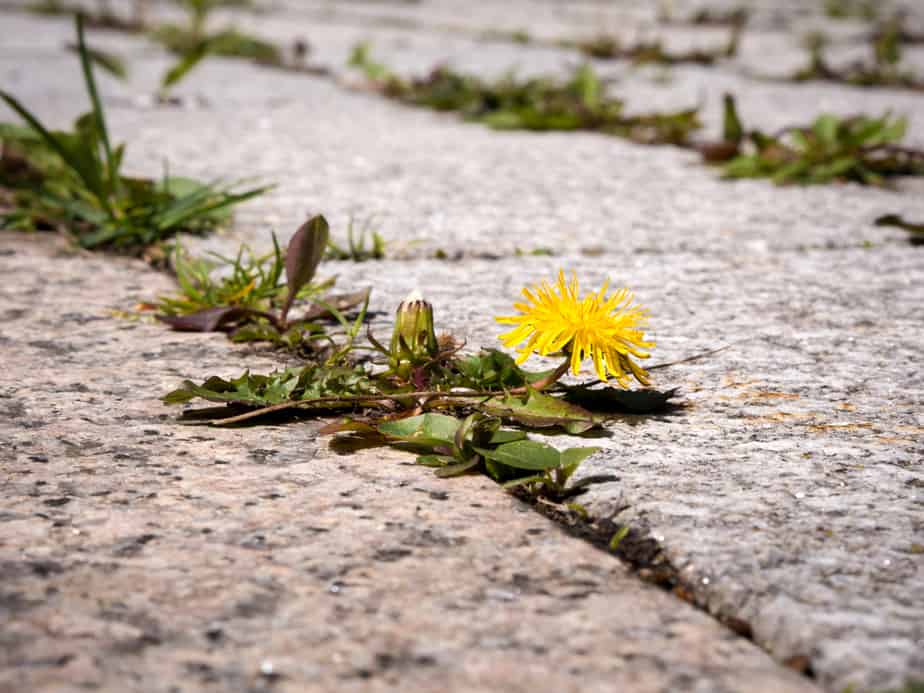For decades, people have been using Epsom salt dissolved in water to feed plants such as roses, tomatoes, and peppers. Doesn’t sound like something that could be used to kill plant-life, does it? It sounds more like a fertilizer. They also function as a pesticide to kill bugs and other pests on your plants. So does Epsom salt kill weeds? The short answer is, “yes”. Let’s take a more in-depth look.

The internet is full of helpful and not-so-helpful, tips for hobbyists out there, even the proverbial green thumbs. For the past several years, there has been a recipe for homemade weed killer doing the online rounds – vinegar, salt, and dish soap.
Let’s Break It Down
The first item on the recipe shopping list is vinegar. There is some argument about whether your run-of-the-mill vinegar, with 5 percent acetic acid or horticultural vinegar, is more effective with up to 20 percent acetic acid. Horticultural vinegar is a specialist product that has been used in organic agriculture as a herbicide for many years. It is considered hazardous to handle and is labeled for agricultural use. It is recommended that you wear appropriate safety gear to minimize contact with your person.
Under the right circumstances, even regular vinegar can rid you of weeds. Some professionals advise that ordinary white vinegar from the grocery store shelf will effectively kill weeds. Adding salt significantly improves its efficacy, but which salt should you use?
Salt Versus Salt
Some recipes call for regular table salt, and others call for Epsom salts. The difference? Epsom salts consist of magnesium sulfate, so they apply two essential plant nutrients: magnesium and sulfur. Historically dissolved in water, Epsom salts are spread as a fertilizer to help vegetation grow better. On the other hand, regular table salt, or sodium chloride, is killing weeds unless they are particularly salt tolerant.
Most organic weed-killing solutions contain some level of saline. The problem is that too much of any type of salt in the garden can lead to wilting and dead plants, not just weeds. Areas, where you spray the solution containing salts, will have the saline content of the soil increase to levels that won’t sustain some plants. It takes time and lots of water to reduce saline levels back to normal. A build-up of either of the salts in your garden soil is bad. Use of table salt carries the potential for sodium toxicity. While Epsom salts provide the plant nutrients magnesium and sulfur, like any fertilizer, overuse can be detrimental to your plants. Excess magnesium can interfere with phosphorus absorption in vegetation. Take this into account before spraying areas of your yard where you wish to maintain flora growth.
There’s not much to say about the dish soap. Its purpose is merely to help the mixture stick to the weeds. Any dish soap will work.
Does It Work?
This popular vinegar and salt weed killer works as a useful tool in your control of weeds, but it is not a cure-all. Be careful where and when you apply it. For example, you will get the best results if you apply the mix in higher temperatures. The mix is a contact weed killer. It only kills the parts of the weeds it touches. Use a spray bottle with a ‘stream’ setting to give a direct shot rather than a mist. Spray directly onto dandelion heads and make sure you don’t get any of the solution on the lawn. Otherwise, you’ll also be dealing with dead grass. It will not kill the roots. Most weeds grow back up from the roots within a few short weeks of being sprayed with the vinegar/salt mix.
Repeated sprays may keep weeds in check. Like any medicine, though, too much is not good. If you decide to move forward with repeated applications, you should seriously consider an occasional good, deep watering to flush the salt through and help alleviate a build-up of plant-unfriendly toxins in the soil. Otherwise, your weed problem will be solved, but you may find yourself with barren soil, unable to produce any vegetation.
Alternative Methods Of Weed Control
Incorporate other methods of weed control as well:
- A ground covering or a thick layer of mulch will block access to sunlight and help control weed growth.
- A pot of boiling water with a tablespoon of salt works a treat on weeds growing up in the cracks of sidewalks, etc.
- Plant ground-covers and perennials in ornamental beds to cover and shade the soil. Weeds can’t take hold in your garden if there’s no space for them.
- Give your garden only what it needs. Use drip irrigation bags or olla pots to provide water only to the roods, not the empty spaces.
- Keep the turning over of your soil to a minimum. Whenever you open a patch of ground, hidden weed seeds find their way to the surface, ready to sprout. Dig only when you need to, and immediately fill the disturbed patch.
- Hand-digging and hoeing are the most effective methods for removing weeds.
- The tried and true method of hand-pulling every weed, from the roots, is still a good idea. Maybe you could pay the kids for the task.